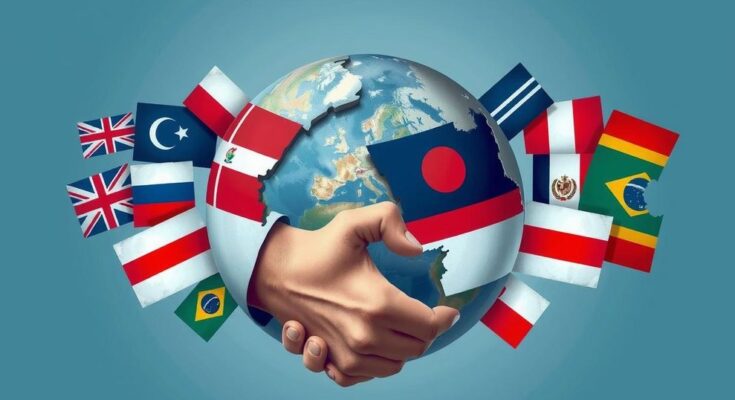South Africa encounters a diplomatic crisis after the expulsion of its U.S. ambassador, Ibrahim Rasool, following criticism from U.S. officials. Tensions reflect deeper policy disagreements between the ANC and the United States, raising questions about South Africa’s diplomatic standing and economic implications, particularly regarding trade agreements like AGOA. As the ANC faces scrutiny over its foreign policy, it must consider recalibrating its international approach to restore relations with the U.S.
South Africa is currently grappling with a diplomatic crisis following the expulsion of its ambassador to the United States, Ibrahim Rasool. This situation intensified after U.S. Secretary of State Marco Rubio declared Rasool “persona non grata,” resulting in significant criticism of South Africa’s foreign policy and raising questions about its international standing and internal politics. Analysts are now evaluating the broader implications of this diplomatic fallout and the ANC’s strategic misjudgments.
The tensions, rooted in significant policy disagreements between the African National Congress (ANC) and the U.S. government, have led to concerns regarding the ANC’s handling of diplomatic relations. Notably, political analyst Kylie Krill, CEO of AfriForum, emphasized the potential ramifications of these errors, indicating that they jeopardize not only South Africa’s international relationships but also its position in global politics.
Secretary Rubio’s remarks not only reflect on Rasool’s actions but also symbolize what some perceive as the ANC’s failures in foreign policy management. Tammy Bruce, the State Department spokesperson, expressed expectations for a representative who facilitates constructive dialogue, stating, “We expect a level of respect, especially if it is in a position built for facilitating international relations.” This follows Rasool’s public criticisms of former President Trump’s policies.
This crisis has emerged amid ongoing strains between South Africa and the U.S., especially in light of Trump’s earlier claims regarding the South African government’s land reform policies targeting white farmers. Trump has suggested that the U.S. should expedite citizenship for these farmers, igniting further tensions that Rasool commented on in a recent forum.
The reactions in South Africa range from outrage to acceptance of the ambassador’s expulsion, with some political commentators asserting that the ANC must refocus its diplomatic strategies. Political analyst Sandile Swana highlighted the need for a more coherent foreign policy, stating, “The expulsion underscores the need for a recalibrated foreign policy that genuinely represents South Africa’s unique position on the global stage.”
The economic repercussions of this diplomatic row are significant. The narrative of the ANC’s historical struggle against apartheid is now complicated by current events, potentially impairing trade negotiations under the African Growth and Opportunity Act (AGOA), which is vital for South African exports to the U.S.
Moreover, financial institutions like Franklin Resources, JP Morgan Chase, and Wells Fargo have started divesting from South African bonds due to these strained relations, affecting the bond market and investor confidence. For instance, Franklin reduced its holdings by 9%, impacting South Africa’s economic stability and reinforcing fears of losing access to AGOA benefits.
The Johannesburg Stock Exchange has reported a striking outflow of around 16.1 billion rand, prompting concerns reminiscent of pre-election uncertainties. Analysts indicate that fears surrounding AGOA’s status are driving increasing divestment among investors.
Prominent ANC leader Nomvula Mokonyane advocated for solidarity with international allies, asserting, “It is essential for South Africa to stand firm against any forms of control from outside forces,” reflecting the party’s resolve amidst declining relations.
While criticism of the ANC’s foreign policy continues to mount, the party insists on recalling its historical struggle in the context of evolving global dynamics. Moving forward from Rasool’s expulsion, it remains uncertain how South Africa will adapt its foreign policy to repair relations with the United States. The country stands at a pivotal moment in its diplomatic journey, requiring a reassessment of its global positioning and strategic choices in international relations.
In conclusion, South Africa is facing a critical diplomatic challenge following the expulsion of ambassador Ibrahim Rasool, which has strained relations with the United States. This incident has revealed underlying tensions in foreign policy between the ANC and U.S. officials, prompting calls for a reassessment of South Africa’s international posture. As economic implications manifest through divestment behaviors and potential trade obstacles under AGOA, the ANC must navigate this landscape carefully to strengthen its foreign relations while addressing domestic political concerns.
Original Source: evrimagaci.org




